 Martin Gore chats at Moogfest 2019 on April 26, 2019. (Photo by Mickey McCarter)
Martin Gore chats at Moogfest 2019 on April 26, 2019. (Photo by Mickey McCarter)
Mute Records founder Daniel Miller first met Martin Gore of Depeche Mode in October 1980 at the Bridge House Pub in Canning Town, London, during a show when the young band supported Fad Gadget. For roughly 40 years now, Daniel and Depeche Mode often have worked closely together. The two old friends met again recently to talk about Martin’s music career at Moogfest 2019 at the Carolina Theatre in Durham, North Carolina.
Visit the Moogfest website for more information on the Moogfest conference and festival.
As Martin recalled during the conversation on April 26, he fell in love with music when he was 10 years old and listened to his mother’s rock and roll records over and over. Soon after hearing Kraftwerk, Martin expanded his interests to electronic music, purchasing copies of Autobahn and Trans-Europe Express.
Martin began playing guitar in a band called Norman and the Worms when he was 13 and then formed another called Composition of Sound with his future bandmates in Depeche Mode, Andrew Fletcher and Vince Clarke. Another friend, Rob Marlow, lent Martin a Korg 700S, and Martin later purchased a Yamaha CS5, his first synthesizer.
“Then, after that there was a burgeoning electronic scene in England. And there were bands like The Human League that started just before we did. And I remember going to see them play in London and being really amazed at their show. They used films behind them. And it was just all so new. So, I really loved what The Human League were doing in the early days. But there were other bands as well. There was a scene going on just before us, OMD, and things like that. So, I think that kind of got me interested in electronic music,” Martin said.
Martin is entirely self-taught on keyboard, never receiving any formal lessons. He taught himself in the 1970s and 1980s by learning to perform chart hits and figuring out their structure from a magazine called Disco 45.
Depeche Mode released its first single, “Photographic,” for Some Bizarre Album in 1981 prior to releasing Speak and Spell, a debut record largely written by Vince Clarke, who left Depeche Mode immediately afterward.
Stream Speak and Spell by Depeche Mode on Spotify:
The band’s early relationship with Daniel Miller equipped them to rapidly evolve, employing sequencers and samplers they wouldn’t otherwise have been able to access.
“Yeah, so I had an Emulator 1, and then Daniel went and got a Synclavier, which helped a bit. But yeah, we would literally sample anything and everything that was around. And so, a lot of our percussion at that time came from the kitchen. And then, for the heavier percussion, we would go out and we were recording in Shoreditch, so there were lots of building sites with these slabs of metal around and fences. So, we’d go and take sledgehammers out and record all of that stuff. And there was one famous sample of us smashing a bit of corrugated iron fence with a sledgehammer and then the site foreman saying, ‘Oi,’” which ended up on the record, Martin recalled.
Daniel and Martin discussed their mutual love of electronic gear, which was pure pleasure for the audience, who ate up every word. Daniel challenged Martin on his love of Eurorack, which grows with every module he adds. “I really like the Malekko Varigate 8 and the Voltage Block. Both of those are so useful. And I mean, I really like a lot of the noise engineering stuff just because it’s very unique and you can get some really aggressive sounding stuff out of it, but then occasionally you get glimmers of beauty in the middle of that aggressive kind of digital noise.”
Earlier, he observed, “I’ve realized that I’ve reached the tipping point a long time ago, yes, because I used to say that the more equipment I have around me, the more creative I will be because it just inspires me to do stuff. But I think now I have so much stuff that I just walk into the studio and think, ‘Where do I start?’”
Martin revealed that he often works on one thing at a time instead of several songs, and that he often simply begins on guitar or piano. “I think it is quite a good idea to get back to real basics and just sit down with a guitar or a keyboard or a piano, or just a keyboard sound and work on the melody and the lyrics, because I think that is the basis of the song. Where you go from there could be anywhere. So, I think that that is probably a good idea, and to not get lost in technology,” Martin said.
His demos lead to collaborations among his bandmates, where they add to a song. The process is similar when Depeche Mode frontman Dave Gahan writes songs, which he has been doing since about 2005, Martin said. Martin recalled the process by which he recorded “Enjoy the Silence” in 1989.
“So, originally the demo for that was just me singing along to a basic pad. And it was really Alan [Wilder] and Flood who suggested that we speed it up and put a beat to it. And I was dead against it. I remember, because I thought it went completely against the aesthetic of the words and the meaning behind the song. So, I sulked off for a little bit” to his rooms in Demark near the recording studio, Puk, Martin said.
“So, when I came back, yeah, it had a basic drum pattern and the baseline and that was all. And I still wasn’t convinced. But Flood said to me, ‘Could you just try playing some guitar along to it?’ So, I played along and then I came up with a guitar line for it. And then the kind of choir part. And then it kind of started making a bit more sense to me,” Martin said.
Martin then acknowledged the song totally makes sense to him now, “and I’d like to take this moment to apologize to Alan and Flood.”
Stream Violator by Depeche Mode on Spotify:
While writing and recording each song may follow its own process, Martin most enjoys playing guitar during Depeche Mode’s concert performances, he confirmed.
“Every song can start differently. But one thing I will say, which I think is going to be slightly sacrilegious here, when we play live, I really enjoy playing the guitar more than playing keyboard. I just feel much more of a connection with the audience, you know? I can be right at the front and just look into people’s eyes. And when I’m playing up behind the keyboard, I just feel completely disconnected. And I find that important personally for me playing live,” Martin said.
Whether playing in front of 500 people or 70,000, Martin gets a physical boost from live performance. “There’s this amazing feeling of togetherness. And I’ve actually said to our manager, Jonathon, once on the last tour when I came off stage, ‘They got me through it,’ because before I went on, I was actually feeling really not very well, feeling sick. And I came off and I said, ‘I didn’t even notice it.’ The moment I got up there, I didn’t even feel like I was sick anymore,” Martin said.
At the end of the conversation, Moog Music CEO Mike Adams presented Martin with a brand new Moog Matriarch and honored him with the 2019 Moog Innovation Award. Still, the thrill of the conversation flowed from the interaction between Martin and Daniel, two old friends and collaborators who still share a lot of common interests and a continuing curiosity about creating music. Daniel said he learned things about Martin he did not know previously, and Martin thanked Daniel for his long support of Depeche Mode.
“We would not be here as a band without Daniel Miller,” Martin said. “We were being offered large sums of money by large record labels. And we chose Mute because we were huge fans of Mute and because Mute was an electronic label and because we felt a trust in Daniel all those years ago. And believe me, A Broken Frame would not have been released by a major label.”
Here are some pictures of Martin Gore and Daniel Miller in conversation at Moogfest 2019 in Fletcher Hall of the Carolina Theatre on April 26, 2019.
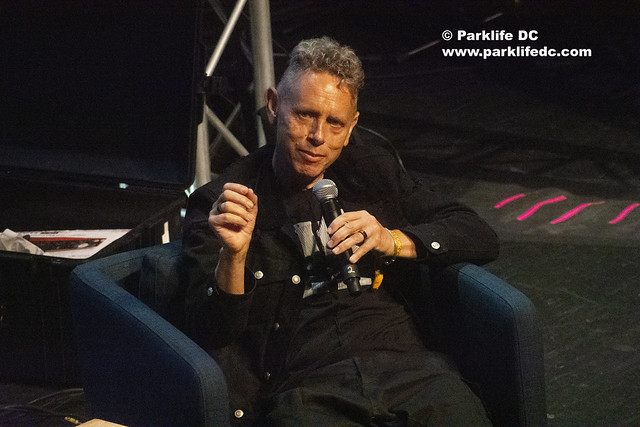
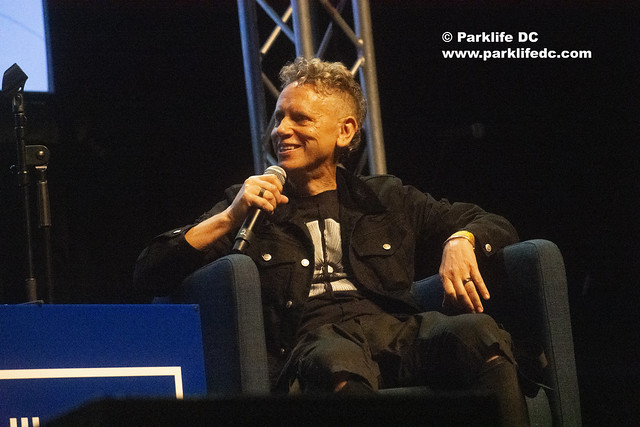

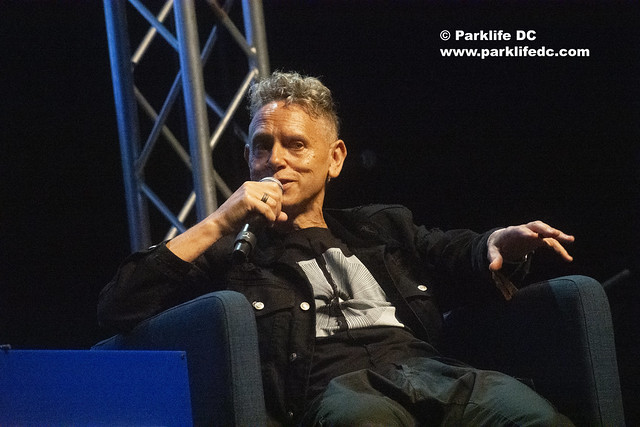
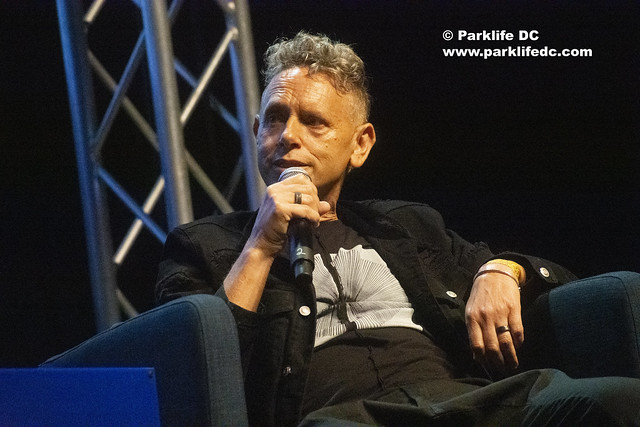

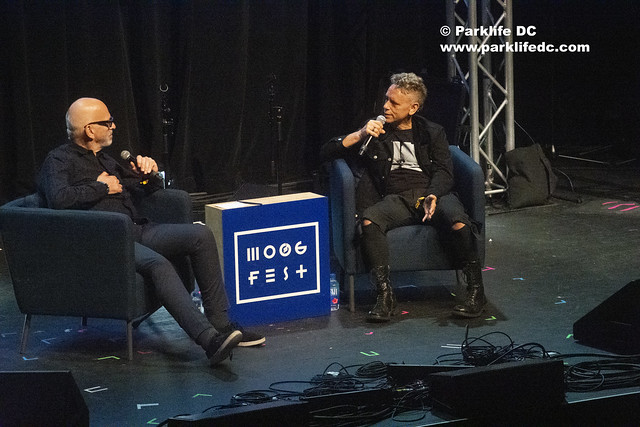
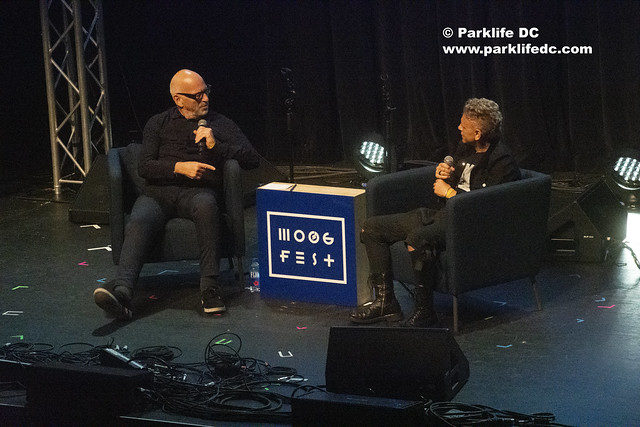
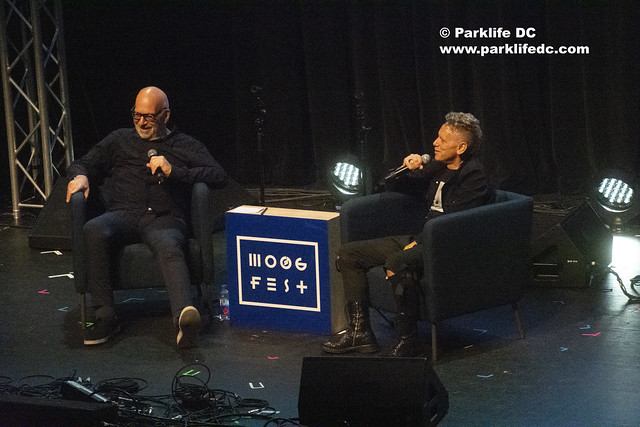


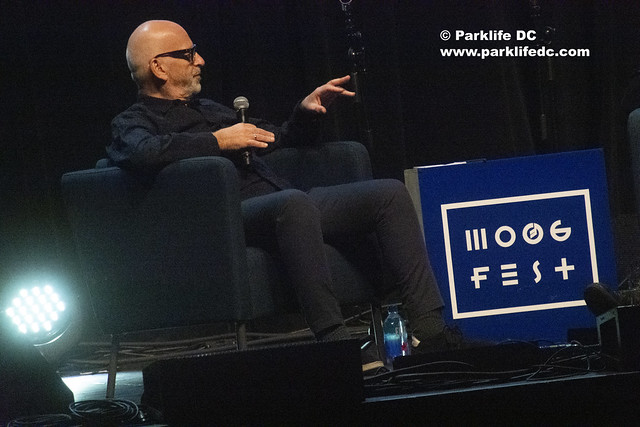
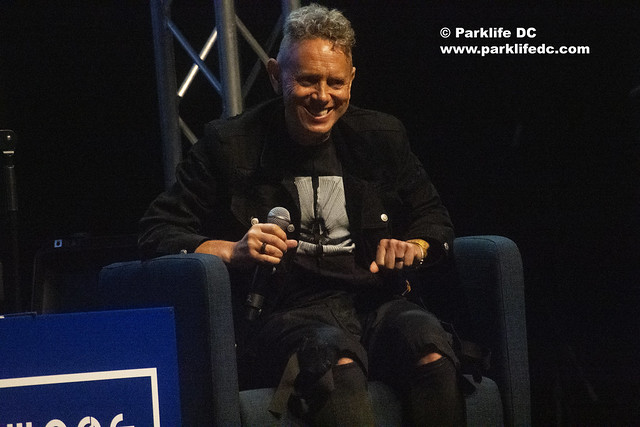








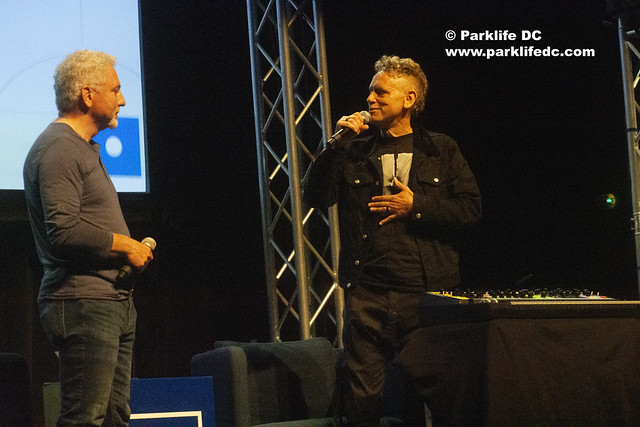
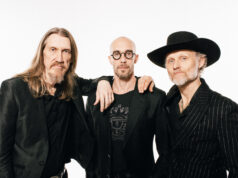
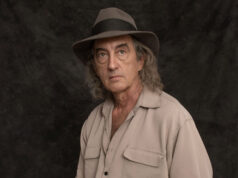




I cannot believe I missed this event! I have absolutely loved and followed modes music from the beginning. A chance to hear these two innovators of music chat about their lives would have been amazing. Thanks for covering this story.
Agreed. It would have been awesome just to be there in the audience. What an awesome collaboration after all these years. One of the best Euro bands ever!
Martin is just a GENIUS, like Emerson or Wakeman…
Fantastic job